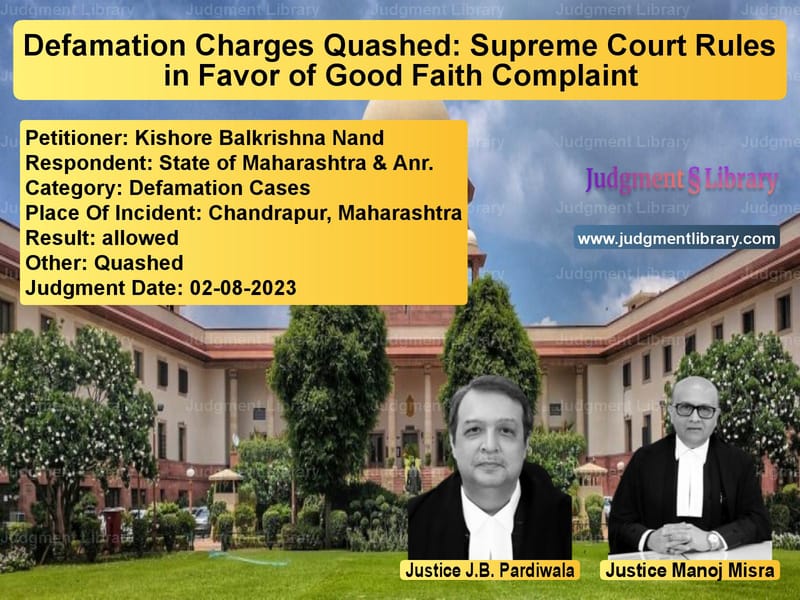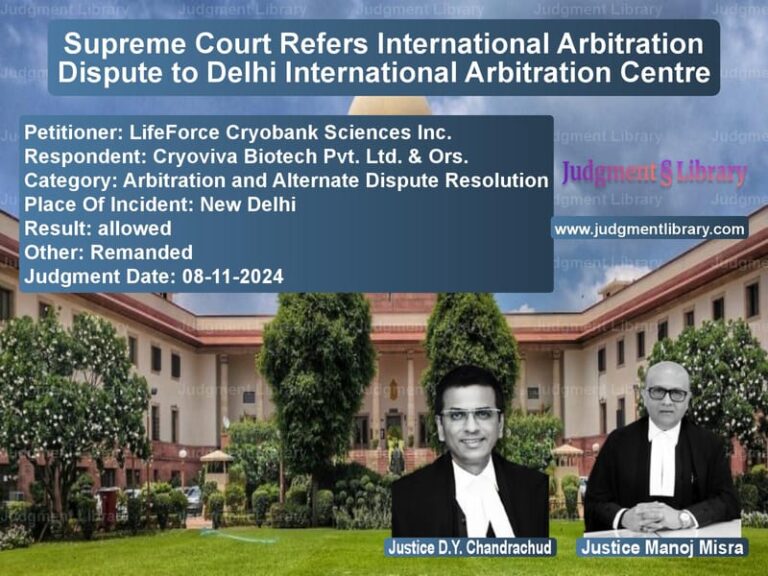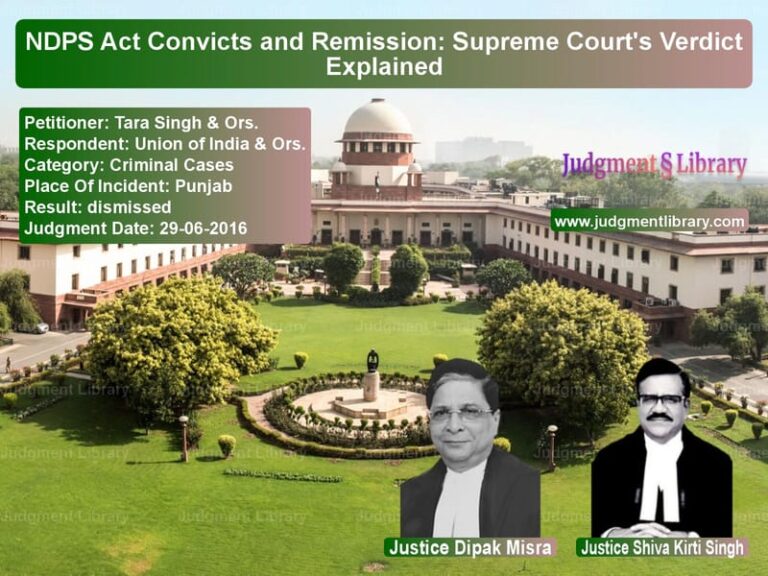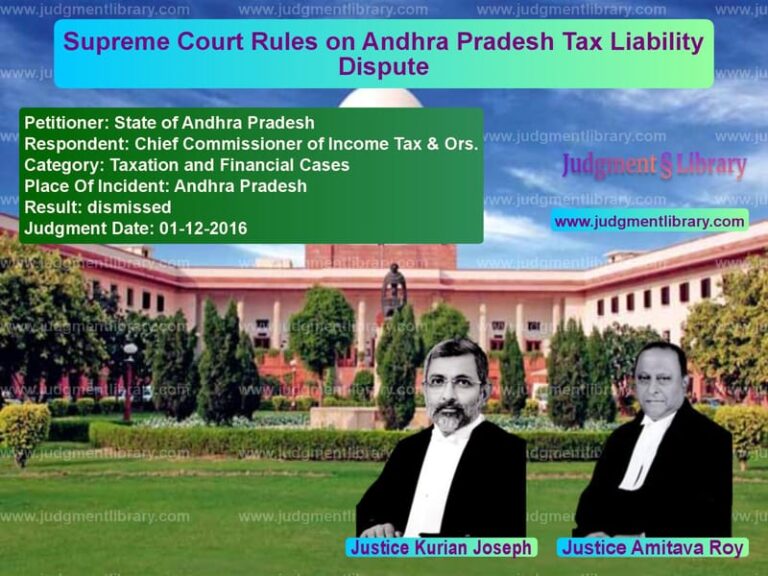Defamation Charges Quashed: Supreme Court Rules in Favor of Good Faith Complaint
The Supreme Court of India recently adjudicated upon a case involving allegations of defamation under Section 500 of the Indian Penal Code (IPC). The case, titled Kishore Balkrishna Nand v. State of Maharashtra & Anr., revolved around whether a complaint made to a public authority, in good faith, could be considered defamatory.
The appellant, Kishore Balkrishna Nand, had initially lodged a complaint with the Sub-Divisional Magistrate (SDM) against the respondent, alleging illegal encroachment and nuisance caused by the respondent’s shop. However, the respondent filed a private complaint before the Judicial Magistrate, alleging defamation. The Magistrate took cognizance and issued summons, leading to a protracted legal battle.
Background of the Case
The issue arose when the appellant, in his complaint to the SDM, stated that the respondent had encroached upon land and was running a shop that attracted anti-social elements, thereby creating a nuisance. The SDM, acting upon the complaint, issued a notice to the respondent.
Subsequently, the respondent filed a private complaint before the Judicial Magistrate, alleging that the statements made in the complaint to the SDM were defamatory. The Magistrate issued a process against the appellant, prompting him to challenge the order.
Legal Proceedings
Following the issuance of summons, the appellant moved the Judicial Magistrate to recall the order, which was granted. The respondent, dissatisfied with this decision, filed a revision before the Sessions Court, which set aside the recall order and reinstated the summons. The appellant then approached the Bombay High Court, where he initially withdrew his petition. However, eight years later, he once again challenged the original order of the Magistrate, which was dismissed on the ground of delay.
Arguments by the Appellant
The appellant’s counsel, Mr. Anshuman Ashok, contended that the Magistrate erred in taking cognizance of a complaint that failed to disclose the commission of any offence. He argued that even if the allegations in the complaint were accepted as true, they did not meet the necessary ingredients of defamation under Section 499 of the IPC.
The counsel further submitted:
- The statements in question were made in good faith to a public authority.
- The complaint was made to the SDM in an official capacity, and not published to the public.
- Since the complaint was not intended to harm the reputation of the respondent, it did not constitute defamation.
Arguments by the Respondent
The respondent, however, contended that the statements made by the appellant were false and intended to malign his reputation. He argued that the issuance of the notice by the SDM, based on the appellant’s complaint, led to unnecessary legal trouble and damage to his credibility.
Supreme Court’s Analysis and Judgment
The Supreme Court, after hearing the arguments, framed the key question: Did the allegations in the complaint to the SDM amount to defamation under Section 500 IPC?
The Court examined Section 499 of the IPC, which defines defamation, and specifically considered the Eighth Exception to the provision, which states:
“It is not defamation to prefer in good faith an accusation against any person to any of those who have lawful authority over that person with respect to the subject-matter of accusation.”
The Court noted that the appellant’s complaint was addressed to the SDM, who had lawful authority over the matter. The statements were not made to the public, and there was no evidence suggesting malice on the part of the appellant.
Referring to Section 52 of the IPC, which defines “good faith,” the Court emphasized that nothing is considered done in good faith unless it is done with due care and attention. The Court observed:
“There is no defamation as such. Exception 8 to Section 499 clearly indicates that it is not defamation to prefer in good faith an accusation against any person to any of those who have lawful authority over that person with regard to the subject-matter of accusation.”
Conclusion
The Supreme Court allowed the appeal, setting aside the High Court’s order. Consequently, the order issued by the Magistrate summoning the appellant was also quashed, effectively terminating the criminal proceedings against him.
This ruling reaffirms the principle that complaints made in good faith to public authorities, within their legal jurisdiction, do not amount to defamation. The judgment provides clarity on the scope of Section 499 and upholds the importance of protecting individuals from frivolous defamation charges arising from legitimate grievances.
Petitioner Name: Kishore Balkrishna Nand.Respondent Name: State of Maharashtra & Anr..Judgment By: Justice J.B. Pardiwala, Justice Manoj Misra.Place Of Incident: Chandrapur, Maharashtra.Judgment Date: 02-08-2023.
Don’t miss out on the full details! Download the complete judgment in PDF format below and gain valuable insights instantly!
Download Judgment: kishore-balkrishna-n-vs-state-of-maharashtra-supreme-court-of-india-judgment-dated-02-08-2023.pdf
Directly Download Judgment: Directly download this Judgment
See all petitions in Civil Defamation
See all petitions in Criminal Defamation
See all petitions in Judgment by J.B. Pardiwala
See all petitions in Judgment by Manoj Misra
See all petitions in allowed
See all petitions in Quashed
See all petitions in supreme court of India judgments August 2023
See all petitions in 2023 judgments
See all posts in Defamation Cases Category
See all allowed petitions in Defamation Cases Category
See all Dismissed petitions in Defamation Cases Category
See all partially allowed petitions in Defamation Cases Category







